Honey and Garlic Benefits for Immune Function

25 Top Home Remedies That Really Work
Explore powerful home remedies for common health issues
Discover how to use everyday household ingredients to address minor ailments
Get practical tips for the safe and effective use of home remedies

25 Top Home Remedies That Really Work
Explore powerful home remedies for common health issues
Discover how to use everyday household ingredients to address minor ailments
Get practical tips for the safe and effective use of home remedies

25 Top Home Remedies That Really Work
Explore powerful home remedies for common health issues
Discover how to use everyday household ingredients to address minor ailments
Get practical tips for the safe and effective use of home remedies

25 Top Home Remedies That Really Work
Explore powerful home remedies for common health issues
Discover how to use everyday household ingredients to address minor ailments
Get practical tips for the safe and effective use of home remedies

25 Top Home Remedies That Really Work
Explore powerful home remedies for common health issues
Discover how to use everyday household ingredients to address minor ailments
Get practical tips for the safe and effective use of home remedies

25 Top Home Remedies That Really Work
Explore powerful home remedies for common health issues
Discover how to use everyday household ingredients to address minor ailments
Get practical tips for the safe and effective use of home remedies

25 Top Home Remedies That Really Work
Explore powerful home remedies for common health issues
Discover how to use everyday household ingredients to address minor ailments
Get practical tips for the safe and effective use of home remedies

25 Top Home Remedies That Really Work
Explore powerful home remedies for common health issues
Discover how to use everyday household ingredients to address minor ailments
Get practical tips for the safe and effective use of home remedies

25 Top Home Remedies That Really Work
Explore powerful home remedies for common health issues
Discover how to use everyday household ingredients to address minor ailments
Get practical tips for the safe and effective use of home remedies

25 Top Home Remedies That Really Work
Explore powerful home remedies for common health issues
Discover how to use everyday household ingredients to address minor ailments
Get practical tips for the safe and effective use of home remedies

25 Top Home Remedies That Really Work
Explore powerful home remedies for common health issues
Discover how to use everyday household ingredients to address minor ailments
Get practical tips for the safe and effective use of home remedies

25 Top Home Remedies That Really Work
Explore powerful home remedies for common health issues
Discover how to use everyday household ingredients to address minor ailments
Get practical tips for the safe and effective use of home remedies

25 Top Home Remedies That Really Work
Explore powerful home remedies for common health issues
Discover how to use everyday household ingredients to address minor ailments
Get practical tips for the safe and effective use of home remedies

25 Top Home Remedies That Really Work
Explore powerful home remedies for common health issues
Discover how to use everyday household ingredients to address minor ailments
Get practical tips for the safe and effective use of home remedies

25 Top Home Remedies That Really Work
Explore powerful home remedies for common health issues
Discover how to use everyday household ingredients to address minor ailments
Get practical tips for the safe and effective use of home remedies

25 Top Home Remedies That Really Work
Explore powerful home remedies for common health issues
Discover how to use everyday household ingredients to address minor ailments
Get practical tips for the safe and effective use of home remedies

25 Top Home Remedies That Really Work
Explore powerful home remedies for common health issues
Discover how to use everyday household ingredients to address minor ailments
Get practical tips for the safe and effective use of home remedies

25 Top Home Remedies That Really Work
Explore powerful home remedies for common health issues
Discover how to use everyday household ingredients to address minor ailments
Get practical tips for the safe and effective use of home remedies

25 Top Home Remedies That Really Work
Explore powerful home remedies for common health issues
Discover how to use everyday household ingredients to address minor ailments
Get practical tips for the safe and effective use of home remedies

25 Top Home Remedies That Really Work
Explore powerful home remedies for common health issues
Discover how to use everyday household ingredients to address minor ailments
Get practical tips for the safe and effective use of home remedies

25 Top Home Remedies That Really Work
Explore powerful home remedies for common health issues
Discover how to use everyday household ingredients to address minor ailments
Get practical tips for the safe and effective use of home remedies

25 Top Home Remedies That Really Work
Explore powerful home remedies for common health issues
Discover how to use everyday household ingredients to address minor ailments
Get practical tips for the safe and effective use of home remedies
For millennia, cultures worldwide have used the medicinal properties of honey and garlic to soothe sore throats, heal skin infections, and manage the common cold.
Discover five honey and garlic benefits for immune function and learn how to incorporate these two superfoods into your daily routine.
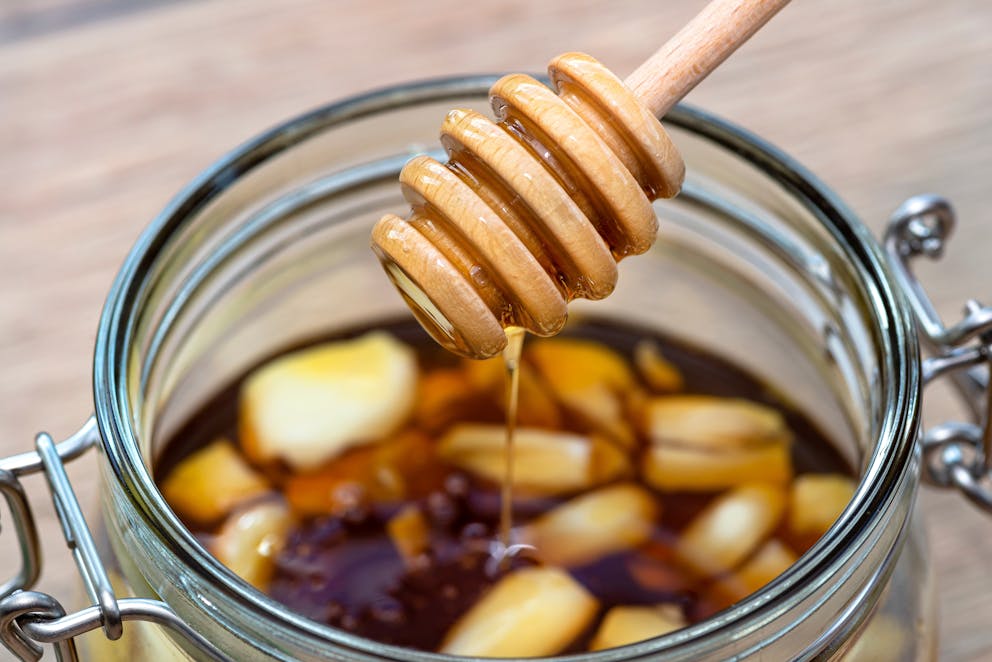
5 honey and garlic benefits for your immune system
The health benefits of fresh garlic are mainly attributed to allicin, a sulfur compound proven to have various health advantages, including potent antimicrobial effects.
Honey has similar benefits while offering a wide range of vitamins, minerals, and pollen, making it a helpful natural remedy for seasonal allergies.
Here are five impressive ways honey and garlic can benefit your immune system.
1. May lower the risk of cancer
Allicin, a primary medicinal compound found in garlic, has potential anti-cancer effects.
Research published in Frontiers of Pharmacology found that allicin can decrease cell proliferation, migration, and metastasis of various cancer cells.
Honey can also act as an anticancer agent due to its antiproliferative and anti-inflammatory effects, which have been found to enhance the immune system's anticancer response.
2. Potent antibacterial properties
Both garlic and honey have antibacterial properties that help eliminate potentially harmful bacteria, including those resistant to conventional antibiotics.
A study published in the Life Science Journal showed that garlic juice and honey demonstrated antibacterial effects on eight types of bacteria, including Streptococcus pyogenes and Staphylococcus aureus, the microbes responsible for strep throat and staph infections.
Interestingly, the antimicrobial properties were most effective when honey and garlic were combined.
3. Protect against viral infections
The organosulfur compounds found in garlic may block viruses from entering cells, which supports the immune system against viral infections.
In addition, honey also has anti-viral properties. A study published in the Archives of Medical Research showed that bioactive components in honey can inhibit the influenza virus and that manuka honey had an especially potent effect against viral infections.
4. Promote detoxification processes
Garlic may enhance the body’s ability to detoxify and eliminate environmental toxins.
A study published in Phytotherapy Research found that certain compounds in garlic can help mitigate the toxic effects of various chemicals on the reproductive system and vital organs.
“Garlic has the ability to bind with organophosphates, a class of pesticides, which helps detox these chemicals from your body,” explains Dr. Berg. “Organophosphates have a devastating effect on your immune system and increase the risk of infection and disease.”
5. Help ease seasonal allergy symptoms
Raw honey contains traces of pollen, and consuming local honey varieties may help improve seasonal allergies by strengthening the immune system’s tolerance to pollen in your area.
A study published in the Annals of Saudi Medicine explains, “Exposure to a constant low dose of allergens in honey may make the body accustomed to its presence and decreases the chance of an overwhelming immune system response.”
Watch the video below to learn more about the health benefits of garlic.
Raw honey vs. pasteurized honey
Pasteurized honey is exposed to heat to slow granulation, giving honey a smoother and more liquid texture. Additionally, pasteurization kills yeast in the honey, which prevents fermentation.
However, heat also destroys various nutrients, including vitamins, antioxidants, and enzymes, attributed to honey’s many health benefits.
In contrast, raw honey is harvested directly from the beehive, retaining pollen, antioxidants, and other health-promoting nutrients, including:
Vitamins B3
Vitamin B5
Vitamin B12
Vitamin C
Calcium
Copper
Zinc
Magnesium
Manganese
Phosphorus
Potassium
Raw honey also contains hydrogen peroxide, which explains why honey can be used as a topical remedy to help heal minor cuts, scrapes, and abrasions.
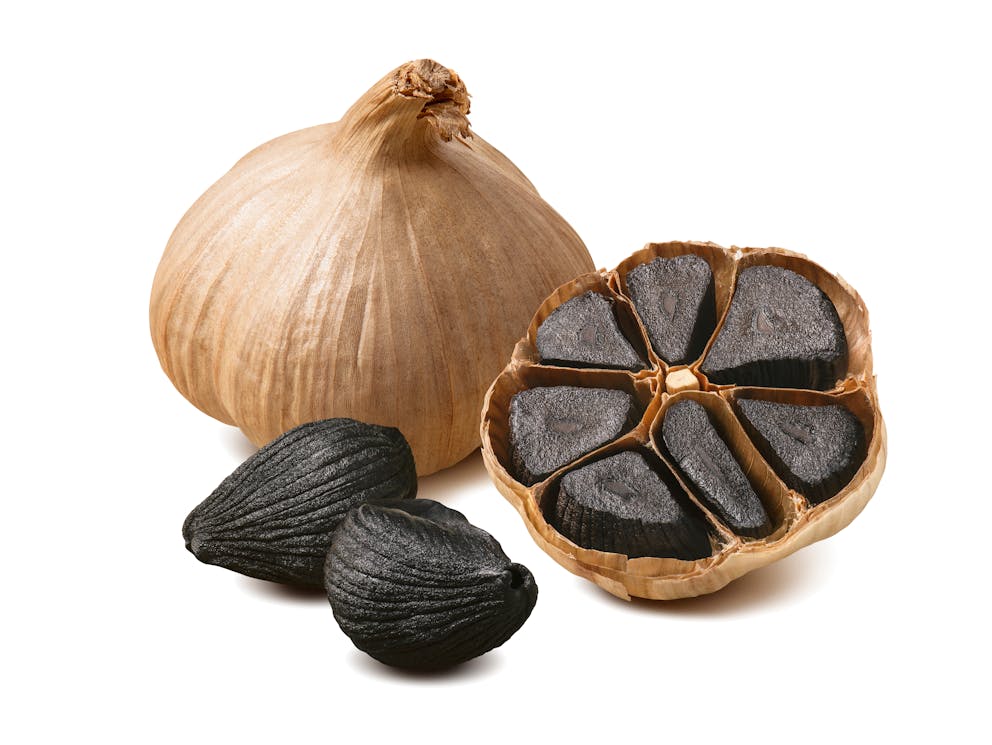
Fresh vs. fermented garlic
Raw garlic contains allicin, which is credited with garlic’s potent antioxidant, antiviral and anti-inflammatory properties.
In addition, raw garlic is a rich source of various nutrients, such as:
Calcium
Iron
Magnesium
Phosphorus
Zinc
Copper
Manganese
Selenium
Though fresh garlic has many health benefits, fermenting garlic can increase the bioavailability of nutrients and boost its antioxidant content, which may help manage and prevent various chronic health conditions.
Garlic is typically fermented in raw honey or by slightly heating and aging it, creating a product known as black garlic.
A study published in Nutrition Research and Practice found that black garlic contains significantly higher concentrations of antioxidants than regular white garlic.
It’s important to note that most garlic available in supermarkets is bleached with chlorine, which decreases its nutritional value.
To maximize garlic’s health benefits, opt for organic, locally grown garlic to avoid chemicals linked to hormonal imbalance, cancer, heart problems, and respiratory issues.
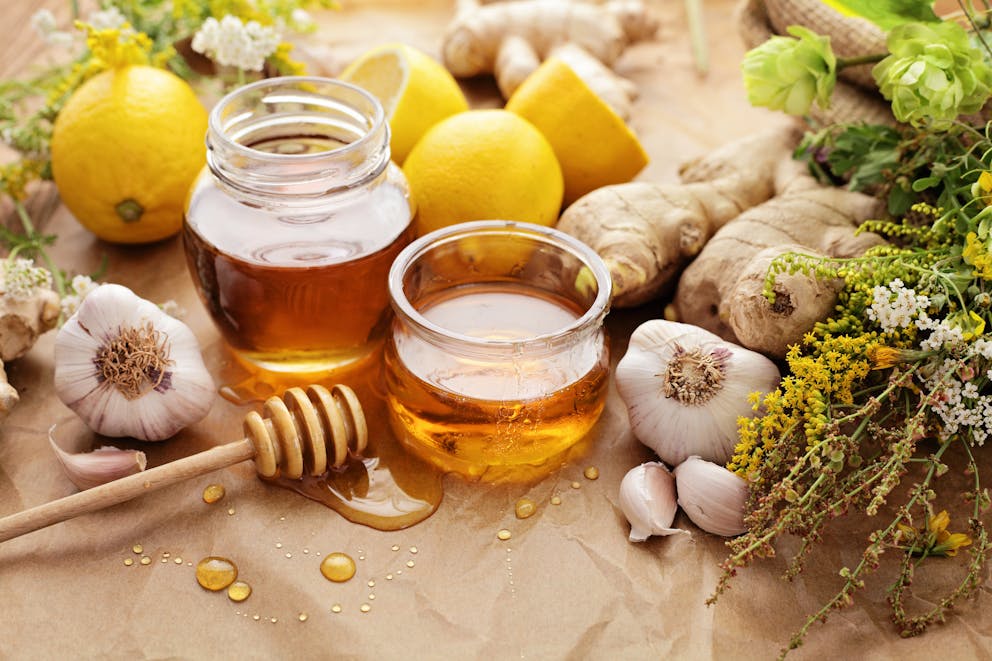
Ways to use honey and garlic
Garlic and honey are excellent natural remedies to alleviate cold and flu symptoms and boost immune defenses.
Here are four ways you can incorporate honey and garlic into your routine.
1. Garlic honey drink
This garlic honey mixture packs the disease-fighting properties of garlic, honey, and echinacea extract to support natural immunity.
For this mixture, you’ll need:
3 garlic cloves
90 drops echinacea extract
1 whole organic lemon (peel included)
1 tablespoon apple cider vinegar
1 tablespoon raw local or manuka honey
16 ounces water
Blend ingredients in a food processor and use at the first sign of illness, or take a shot (1.5 ounces) of garlic honey drink once daily during cold and flu season.
2. Honey-fermented garlic
Honey-fermented garlic has been used for generations for its nutritional and medicinal properties.
To ferment garlic with honey, place peeled garlic cloves in a glass jar with an air-tight lid. Pour raw, organic honey over the garlic cloves until they’re covered. Seal jar and store at room temperature for three days.
After a few days, open the jar and check for signs of fermentation. If gas is released and tiny bubbles are forming, the garlic is starting to ferment.
Stir honey and garlic, and reseal jar for a few weeks to continue the fermentation process.
To use honey-fermented garlic, consume one fermented garlic clove daily. This natural remedy can be especially beneficial during the winter months and may help prevent bacterial and viral infections.
Storing fermented garlic honey is easy as it doesn’t need to be refrigerated and can be left at room temperature for up to one year.
3. Homemade salad dressing
Homemade salad dressing is one of the easiest ways to incorporate garlic and honey into your diet.
Combine fresh garlic cloves, olive oil, balsamic vinegar, and organic honey to create a delicious and health-promoting dressing.
You can also create a vinaigrette using apple cider vinegar, olive oil, honey, and crushed garlic. Apple cider vinegar can enhance the health benefits of garlic and honey due to its potent anti-inflammatory and antimicrobial properties.
4. Add to meals
Garlic is versatile and can be added to a variety of dishes to boost flavor and immune defense.
Cooking garlic doesn’t affect its medicinal properties. The health-promoting compounds found in garlic are heat-resistant up to 212 degrees F (100 degrees C) for as long as 20 minutes.
Add crushed garlic cloves to soup, roasted vegetables, salsa, or cauliflower mashed potatoes. You can also use garlic powder to season steak, fish, or chicken.
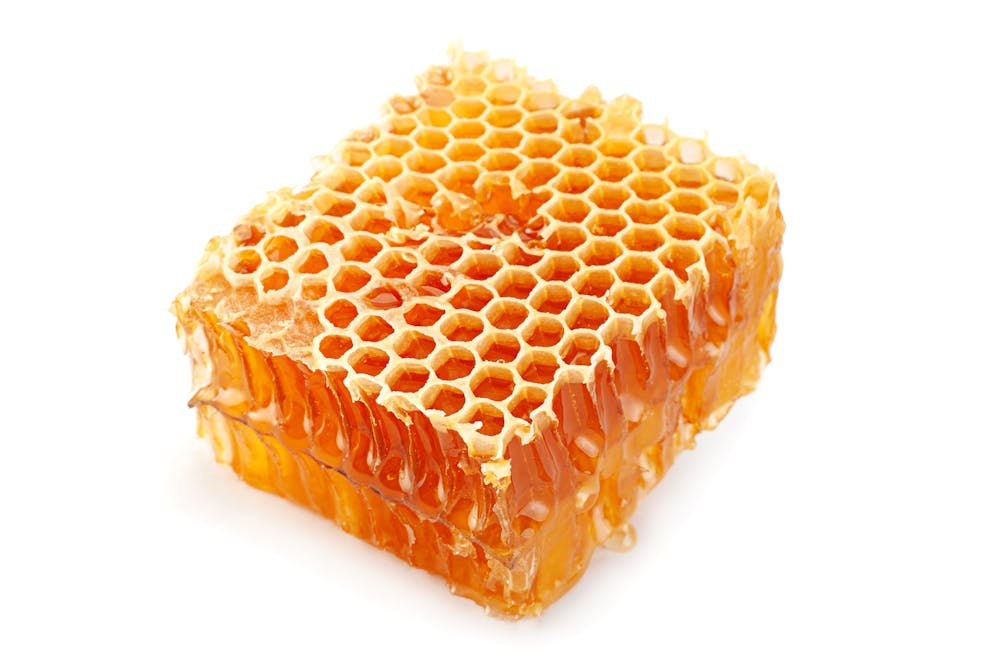
How much garlic and honey should you have?
It’s safe to consume both garlic and honey daily. However, avoid eating too much raw honey, as it’s high in sugar and may increase blood sugar levels, which can lead to metabolic imbalances and weight gain.
You can use garlic liberally in dressings and marinades, as well as a seasoning for various recipes. However, remember that too much garlic can lead to stomach upset and bad breath.
Consuming one to two garlic cloves daily is associated with improved immune function while minimizing the risk of gastrointestinal side effects.

Possible downsides of honey and garlic
Despite their many health benefits, garlic and honey may lead to adverse reactions in those with certain health concerns.
Individuals with the following health issues should be cautious when using garlic or honey.
1. Blood sugar imbalances
Honey is high in sugar, which can lead to elevated blood sugar levels and worsen health issues such as diabetes, insulin resistance, or metabolic syndrome.
It's recommended that individuals with poor blood sugar control consult a healthcare provider before adding honey to their routine to minimize the risk of adverse health effects.
2. Blood thinning disorders
Consuming large amounts of garlic or taking garlic supplements can have a blood-thinning effect, increasing the risk of bruising and excessive bleeding.
In addition, it isn’t recommended to consume garlic in combination with certain medications, including:
Blood thinners
Antidiabetic drugs
Antihypertensive drugs
Protease inhibitors
Discuss the use of garlic with your doctor if you have underlying health issues or are taking prescription medications.
3. Allergic reactions
Although honey can help improve seasonal allergies, it’s important to be aware of the increased risk of allergic reactions.
Those with allergies to pollen may be at an increased risk of experiencing allergic symptoms, including hives, wheezing, difficulty breathing, and rashes when consuming honey.
In addition, young children shouldn’t be given honey, as it can contain bacterial spores that may lead to botulism. This serious and potentially life-threatening condition can lead to muscle weakness, difficulty breathing, paralysis, and, in severe cases, even death.
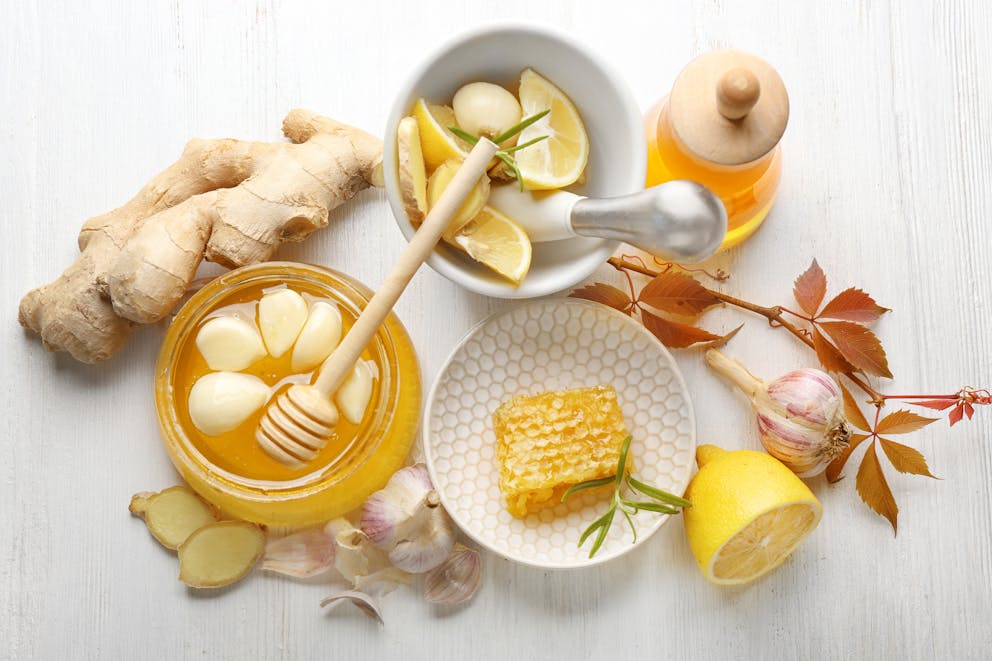
Key takeaways
There are several impressive honey and garlic benefits for immune function, including antibacterial and antiviral effects that can help lower the risk of infections. These superfoods may also enhance detoxification processes and promote the body’s anticancer responses.
Raw honey and fermented garlic have the most health benefits and can be incorporated into salad dressings or used to create homemade garlic and honey shots.
FAQ
1. What are the top honey and garlic benefits for immunity?
Honey and garlic contain antibacterial and antiviral compounds proven to enhance the immune system response to bacteria and viruses. This can help lower the risk of microbial infections such as the flu and common cold.
2. What happens if you have garlic and honey before bed?
Consuming garlic and honey before bed may promote restful sleep. Both honey and garlic cloves contain nutrients that can improve sleep quality, including magnesium and zinc.
Honey also contains L-tryptophan, an amino acid shown to increase sleepiness and reduce the time it takes to fall asleep.
3. When should I eat garlic in the morning or at night?
You can have garlic at any time of the day. However, the best time to eat garlic may be in the morning, as garlic can increase stomach acidity, promoting optimal digestion and nutrient absorption.
4. What is the best type of honey for your immune system?
Manuka honey is considered the best choice for promoting immune system functions as it contains unique compounds not found in other types of honey, such as methylglyoxal.
Methylglyoxal has potent antimicrobial and anti-inflammatory properties, making manuka honey one of the best choices to support strong immune defenses.
Sources
Previous blog
Seven Warning Signs That You're Eating Too Much SugarTags

Popular
08/21/2024
55.7K views
02/23/2025
46.8K views
11/18/2024
281.1K views
03/18/2024
11/21/2022




